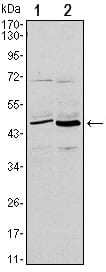
| WB | 1/500 - 1/2000 | Human,Mouse,Rat |
| IF | 咨询技术 | Human,Mouse,Rat |
| IHC | 咨询技术 | Human,Mouse,Rat |
| ICC | 技术咨询 | Human,Mouse,Rat |
| FCM | 咨询技术 | Human,Mouse,Rat |
| Elisa | 1/10000 | Human,Mouse,Rat |
| Aliases | B70; B7-2; LAB72; CD28LG2; MGC34413; CD86 |
| Entrez GeneID | 942 |
| clone | 1B3 |
| WB Predicted band size | 52kDa |
| Host/Isotype | Mouse IgG1 |
| Antibody Type | Primary antibody |
| Storage | Store at 4°C short term. Aliquot and store at -20°C long term. Avoid freeze/thaw cycles. |
| Species Reactivity | Human |
| Immunogen | Purified recombinant fragment of human CD86 expressed in E. Coli. |
| Formulation | Ascitic fluid containing 0.03% sodium azide. |
+ +
以下是关于CD86抗体的3篇参考文献及其摘要内容:
---
1. **文献名称**: *CD86 and CD80 differentially modulate the suppressive function of human regulatory T cells*
**作者**: Wing K, et al.
**摘要**: 研究探讨了CD86与CD80在调节性T细胞(Treg)功能中的差异作用,发现抗CD86抗体可阻断CD86与T细胞表面CD28的相互作用,显著增强Treg的免疫抑制活性,提示靶向CD86可能用于治疗自身免疫性疾病。
---
2. **文献名称**: *Targeting CD86 expression on tumor-associated macrophages with anti-CD86 antibody enhances anti-tumor immunity*
**作者**: Zhang Y, et al.
**摘要**: 该文献报道了一种新型抗CD86抗体通过靶向肿瘤相关巨噬细胞(TAMs)表面的CD86分子,阻断其免疫抑制信号,促进T细胞活化并抑制肿瘤生长,为癌症免疫治疗提供了新策略。
---
3. **文献名称**: *Dual blockade of CD80 and CD86 enhances dendritic cell-mediated anti-tumor immune responses*
**作者**: Hodi FS, et al.
**摘要**: 研究通过同时使用抗CD80和抗CD86抗体阻断树突状细胞的共刺激信号,发现可协同增强肿瘤抗原提呈能力,并显著提升T细胞抗肿瘤反应,支持联合阻断策略在免疫检查点治疗中的潜力。
---
4. **文献名称**: *CD86 signaling modulates IL-10 production in B cells during autoimmune inflammation*
**作者**: Li R, et al.
**摘要**: 该研究揭示了CD86信号在B细胞介导的自身免疫炎症中的作用,抗CD86抗体通过抑制B细胞分泌IL-10.减轻小鼠模型中的炎症损伤,提示其作为类风湿性关节炎等疾病的潜在治疗靶点。
---
以上文献涵盖了CD86抗体在调节免疫抑制、肿瘤治疗及自身免疫疾病中的机制与应用研究。
CD86. also known as B7-2. is a co-stimulatory protein belonging to the B7 family of immune checkpoint molecules. It is primarily expressed on antigen-presenting cells (APCs), such as dendritic cells, macrophages, and activated B cells, where it interacts with CD28 and CTLA-4 receptors on T cells to regulate immune responses. The binding of CD86 to CD28 provides a critical secondary signal for T cell activation, while its interaction with CTLA-4 delivers inhibitory signals to suppress T cell function, maintaining immune tolerance. Dysregulation of CD86 is implicated in autoimmune diseases, transplant rejection, and cancer immune evasion.
CD86-targeting antibodies are tools or therapeutics designed to modulate these interactions. In cancer immunotherapy, blocking CD86-CTLA-4 engagement (e.g., via anti-CTLA-4 antibodies like ipilimumab) enhances anti-tumor immunity by sustaining T cell activation. Conversely, agonist antibodies that promote CD86-CD28 signaling may boost immune responses in chronic infections or vaccines. Inhibitory antibodies against CD86 itself are explored for autoimmune conditions to dampen pathogenic T cell activity. Structurally, CD86 antibodies typically recognize extracellular IgV or IgC domains of the protein. Challenges include balancing therapeutic efficacy with immune-related adverse events, given CD86’s dual role in activation and suppression. Research continues to optimize specificity and delivery strategies for clinical applications.
×